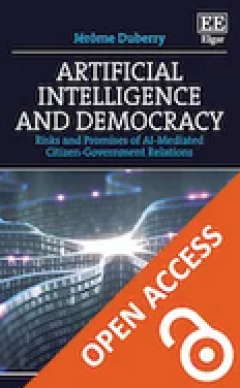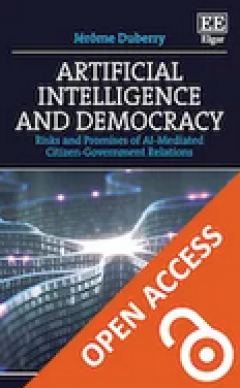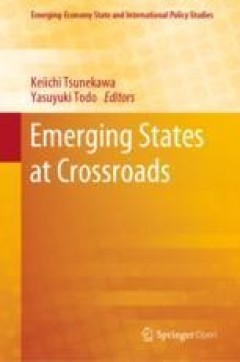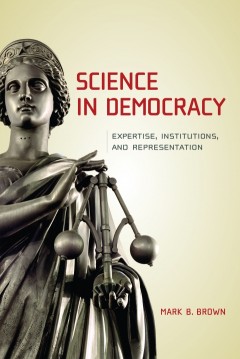Filter by

Artificial Intelligence and Democracy
This is an open access title available under the terms of a CC BY-NC-ND 4.0 License. It is free to read, download and share on Elgaronline.com. This insightful book explores the citizen-government relation, as mediated through artificial intelligence (AI). Through a critical lens, Jérôme Duberry examines the role of AI in the relation and its implications for the quality of liberal democracy …
- Edition
- -
- ISBN/ISSN
- 9781788977319
- Collation
- online resource
- Series Title
- -
- Call Number
- -

Artificial Intelligence and Democracy
This is an open access title available under the terms of a CC BY-NC-ND 4.0 License. It is free to read, download and share on Elgaronline.com. This insightful book explores the citizen-government relation, as mediated through artificial intelligence (AI). Through a critical lens, Jérôme Duberry examines the role of AI in the relation and its implications for the quality of liberal democracy …
- Edition
- -
- ISBN/ISSN
- 9781788977319
- Collation
- oer.unej.ac.id
- Series Title
- -
- Call Number
- -

After the new social democracy: Social welfare for the 21st century
Social democracy has made a political comeback in recent years, especially under the influence of the Third Way. Not everyone is convinced, however, that Third Way social democracy is the best means of reviving the Left's project. This book considers this dissent and offers an alternative approach. Bringing together a range of social and political theories, After the new social democracy engage…
- Edition
- -
- ISBN/ISSN
- 9780719064760
- Collation
- -
- Series Title
- -
- Call Number
- -

Energy Transition and Energy Democracy in East Asia
Today, wind powers and solar powers have become the main stream of energies. Everyone, from major electric power utilities to mega capital investors, has entered the renewable energy sector, increasingly and rapidly expanding the mass capital investment projects in the world. It is not rare to find cases of such mega projects developing confrontations with local communities. Since 1990s, th…
- Edition
- -
- ISBN/ISSN
- 9789811902802
- Collation
- IX, 117
- Series Title
- -
- Call Number
- -

Emerging States at Crossroads
This volume analyzes the economic, social, and political challenges that emerging states confront today. Notwithstanding the growing importance of the ‘emerging states’ in global affairs and governance, many problems requiring immediate solutions have emerged at home largely as a consequence of the rapid economic development and associated sociopolitical changes. The middle-income trap is a…
- Edition
- -
- ISBN/ISSN
- 9789811328596
- Collation
- XIII, 293, hlm,: ill, lamp;
- Series Title
- -
- Call Number
- -

Civil democracy protection : success conditions of non-governmental organisat…
Civil Democracy Protection is an overview of attempts by organisations to oppose groups that are perceived to threaten democracy. The book traces the history of civil democracy protection actors from the establishment of democratic constitutional states up to the present day and develops a set of systematic and comparative approaches. The central question it explores is: What significance do…
- Edition
- -
- ISBN/ISSN
- 9781003321880
- Collation
- -
- Series Title
- -
- Call Number
- 320 CIV

The anthropology of parliaments : entanglements in democratic politics
- Edition
- -
- ISBN/ISSN
- 9781003084488
- Collation
- -
- Series Title
- -
- Call Number
- -
- Edition
- -
- ISBN/ISSN
- 9781003084488
- Collation
- -
- Series Title
- -
- Call Number
- -

The Australian horn of plenty: how Britain's Australian colonies gained democ…
Democracy -- What were the 1850s constitutions and electoral laws? -- The ideas that formed these new Australian colonial democracies -- The Colonial leaders that fought for and opposed democracy -- Obstructive Legislative Councils (upper houses) -- New South Wales -- The 18th century colony -- Victoria -- The colony of the goldfields and Eureka stockade -- South Australia -- The democracy colo…
- Edition
- -
- ISBN/ISSN
- 9781003490739
- Collation
- -
- Series Title
- -
- Call Number
- -

Science in Democracy: Expertise, Institutions, and Representation
Mark Brown draws on canonical & contemporary political & scientific theory, from Machiavelli to Latour, to throw light on how scientific expertise may be brought into a representative democracy.OCLC-licensed vendor bibliographic record.
- Edition
- -
- ISBN/ISSN
- 9780262258647
- Collation
- 1 online resource (xvi, 354 pages)
- Series Title
- -
- Call Number
- -

Ethics, Politics, and Democracy: From Primordial Principles to Prospective Pr…
Interdisciplinary discussion of the normative underpinnings of political governance from Ancient Mesopotamia to modern AmericaThis volume examines continuities and change in the normative underpinnings of both ancient and modern practices of political governance, public duties, private virtues, and personal responsibilities. As such, it stands at the cross-disciplinary intersection between the …
- Edition
- -
- ISBN/ISSN
- 9780262270397
- Collation
- 1 online resource (xvii, 357 pages)
- Series Title
- -
- Call Number
- -
 Computer Science, Information & General Works
Computer Science, Information & General Works  Philosophy & Psychology
Philosophy & Psychology  Religion
Religion  Social Sciences
Social Sciences  Language
Language  Pure Science
Pure Science  Applied Sciences
Applied Sciences  Art & Recreation
Art & Recreation  Literature
Literature  History & Geography
History & Geography